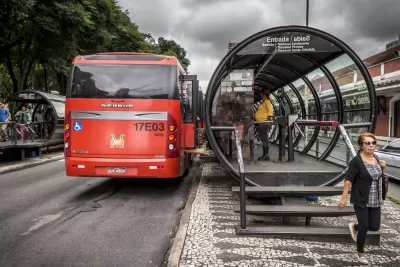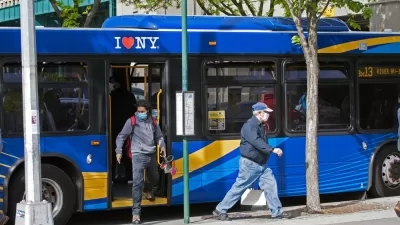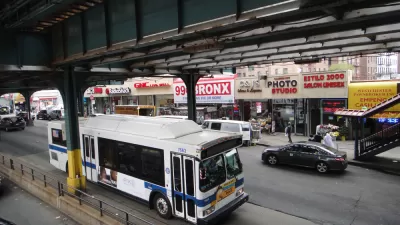American transit systems are increasingly moving to structures that allow pre-paying and all-door boarding. David Meyer argues that these systems have proven their worth and fears of fare evasion aren't enough to justify inferior services.

In New York, transit officials are prioritizing collecting every fare over providing faster more efficient transportation, argues David Meyer in a piece for Streetsblog NYC. "Speaking at TransitCenter last night, transportation officials from Boston, San Francisco, London, and Oslo shared how their agencies put the rider experience at the center of fare modernization efforts. They see the possibilities to provide fast, convenient service, and they are seizing them," Meyer reports.
The issue in question is all-door boarding for buses. All-door boarding means that rather than having each passenger slide a fare card into a machine in front of the driver as they board, bus riders could pay before boarding or at stations on the buses at both doors. Then, periodically, fare agents would check whether or not riders had paid using electronic proof-of-payment systems. Advocates of this system, like Meyer, argue that this payment process could potentially save minutes at every crowded bus stops and shave commute times for bus riders during the most busy times. Those who oppose all door boarding argue that the system creates an opportunity for riders to avoid paying.
Meyers finds this argument unconvincing, "New Yorkers could have faster transit, less police harassment, and a more convenient fare system too, if the MTA follows the lead of these agencies and gets out of its own way."
FULL STORY: How Cities Stopped Panicking About Fare Evasion and Made Transit Faster

Trump Administration Could Effectively End Housing Voucher Program
Federal officials are eyeing major cuts to the Section 8 program that helps millions of low-income households pay rent.

Planetizen Federal Action Tracker
A weekly monitor of how Trump’s orders and actions are impacting planners and planning in America.

Ken Jennings Launches Transit Web Series
The Jeopardy champ wants you to ride public transit.

Rebuilding Smarter: How LA County Is Guiding Fire-Ravaged Communities Toward Resilience
Los Angeles County is leading a coordinated effort to help fire-impacted communities rebuild with resilience by providing recovery resources, promoting fire-wise design, and aligning reconstruction with broader sustainability and climate goals.

When Borders Blur: Regional Collaboration in Action
As regional challenges outgrow city boundaries, “When Borders Blur” explores how cross-jurisdictional collaboration can drive smarter, more resilient urban planning, sharing real-world lessons from thriving partnerships across North America.

Philadelphia Is Expanding its Network of Roundabouts
Roundabouts are widely shown to decrease traffic speed, reduce congestion, and improve efficiency.
Urban Design for Planners 1: Software Tools
This six-course series explores essential urban design concepts using open source software and equips planners with the tools they need to participate fully in the urban design process.
Planning for Universal Design
Learn the tools for implementing Universal Design in planning regulations.
Ada County Highway District
Clanton & Associates, Inc.
Jessamine County Fiscal Court
Institute for Housing and Urban Development Studies (IHS)
City of Grandview
Harvard GSD Executive Education
Toledo-Lucas County Plan Commissions
Salt Lake City
NYU Wagner Graduate School of Public Service





























